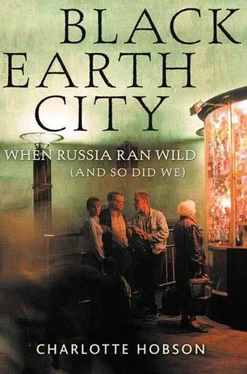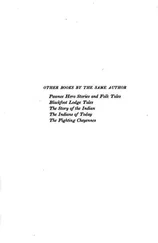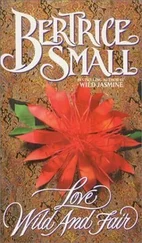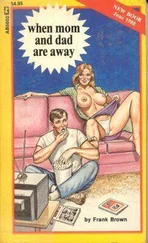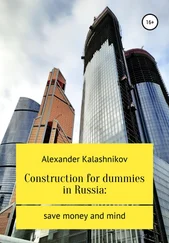Late each evening Mitya’s silhouette disappeared around the corner and I turned back to the hostel, which wore an air of postcoital smugness that almost drove me mad. Ira and Joe would be dozing peaceably together in our room. Emily and Yuri were down in Room 99, partying. Yakov and Nina were still together: it seemed as though every time you opened a closet, they would appear, looking rumpled and dusty and pleased. Why were Mitya and I incapable of doing the same? We were bashful, that was all, and awkward. Out in the street it all came naturally, but indoors I was always flinging my arms up and almost breaking Mitya’s nose, and then he’d tread on my toes and we’d both get embarrassed. There was no lack of willingness; I’d have gone into a closet with Mitya any day, though it’s lucky, with hindsight, that we didn’t. We’d probably have done each other permanent damage. As it was, we walked until our feet were frozen and our noses turned from red to purplish gray. We walked and walked and still slept badly at nights.
At a certain point it became too cold to stay outside all evening. There was a crazed feeling about the hostel: the siege was beginning and we’d be in this together until April at the earliest. There was a lot of drinking and Sasha, who had served in Afghanistan and was therefore, on occasion, overemotional, went on a three-day bender and smashed his room up.
Ira and Joe didn’t care; they lay motionless and gazed into each other’s eyes. Twenty people could be dancing in their boots so the floor bounced and plaster dust streamed from the ceiling, and Joe’s beatific smile would not waver. It has to be said that large amounts of drugs played a part in this admirable repose. Mitya and I couldn’t emulate it: we just wanted to be on our own.
Soviet culture came unexpectedly to our aid. In Voronezh there were at least three cinemas, as well as the opera, the Philharmonia, the puppet theater, the Theater of the Young Spectator, and the Drama theater. Mitya and I saw every show in town. We went to double bills at the cinema on Revolution Prospect and to hear Gershwin played in the afternoons at the Philharmonia. We began to recognize the musicians: the patrician oboist with his hair slicked back, and the first violinist who seemed always on the verge of tears. The audience, too, repeated itself—four or five old ladies who never missed a concert, a large self-satisfied man who announced his opinion: “Of course they do not understand Gershwin, not at all.”
We sat at the back and dreamed, and Mitya leaned over and whispered in my ear. “One day we’ll live on a yacht. Thousands of kilometers of empty sea on every side.”
Our venue of choice, however, was the opera. The theater itself, like a bulky old dowager wearing her jewels, had a particular charm. A row of fat, stumpy columns adorned the façade while, inside, the hall was marble, lit by grimy chandeliers. The theatrical terms in Russified French sounded to me genteel in the extreme.
“You’re sitting in the parterre ,” we were told. “There will be one entrakt of twenty minutes.”
Tickets for the front row of the stalls cost six rubles (about thirty cents). There was a specially shaped brass plate at the box office to receive your coins, and an old woman in the garderob , the cloakroom, who scolded me every time we came for not having sewed a hook into my coat.
The opera was a repertory theater and its productions had been doing solid service for years. Part of our enjoyment came from the fact that age had not so much added its patina as scraped off the polish. These were no seamless, flawless creations: the performers wrestled visibly with their roles. They sweated, they heaved, they suffered in too-tight corsets. And the audience rewarded them for it. They applauded the physical feats, the arias belted out against the constraints of costume, the rickety staircases managed at a run, the sword fights that ended in panting corpses. Mitya and I saw every detail from our front-row seats.
It was at the opera that we first saw the triangle player. During an uneventful performance of Eugene Onegin , we found our attention distracted by the orchestra. There were some of our friends from the Philharmonia again. But about half an hour into the first act, the pit door opened and in strolled a young man with an instrument case. He sat down, took a book out of his pocket, and began to read. After a few minutes he searched about in his pocket and found a hard candy. We were so close that a waft of sickly orange reached us. The conductor, we thought, looked agitated. After some time, the young man stirred. Still reading, he reached out with one hand to open his instrument case and take out a triangle. He stood up and asked his neighbor, the drummer, to show him where they’d got to. For half a minute or so he waited, then struck a little ping-a-ling-a-ling. Then, to our great delight, he packed up his triangle and his book, nodded good-bye to the drummer, and left.
After the intermission Mitya and I couldn’t bring ourselves to watch the rest of Tatyana’s fate. Instead we sat in the opera buffet, well known for its Turkish coffee and zefir , nutty meringues, and reveled in the idea of the triangle player.
“He’s probably been working up to that position for years,” said Mitya. “First in the youth orchestra, then as understudy—”
I giggled. “Years. He must dream of triangles—”
“Yes—traffic signs, and geometrically shaped bosoms, and the secrets of the Great Pyramid.”
“And what about his home life? He practices so much, his triangle comes between him and his wife, and one day he finds her in bed with the conductor.”
When we had eaten as many meringues as we could we walked back to the hostel, planning a detective novel around our hero. Three lovers, three deaths, and the most unbearable suspense until the last page, when, with a single ping!, it would be revealed that—
At the hostel the vakhtersha as usual made trouble and would let Mitya in for only half an hour. We stood on the steps for a bit and then Mitya went home, as always, digging his hands deep into his pockets. I wanted to cry. The entire Soviet system seemed to be the third point in our triangle.
It was the Uvarovs who unwittingly supplied the answer to our dilemma. One afternoon, Masha visited me and Emily in the hostel. She stood in our room trying not to notice the squalor, as though she had a favor to ask. In fact, the opposite was true: Masha took me aside and whispered that the whole family was going up to Moscow for the week, and perhaps we would like to borrow their apartment? As I accepted, hurriedly, it occurred to me that this was the wish I had tossed into their stew, digested and become thought.
Emily and I moved into the apartment on Saturday and marveled at the luxury. The decor was not lavish by most standards, but we had hot showers whenever we wanted and a clean oven. Hell, we could sit in separate rooms and not even hear each other—that felt good. I slept on a bed in the sitting room, in an alcove hung with red velvet curtains.
Mitya was out of town for most of the week at a wedding, and there was no way of letting him know the news. But on Friday he returned and phoned to say he was coming ’round; instantly, he was on his way.
Emily and Yuri had gone to Moscow the day before. Edik, Ira, and Joe had been with me all afternoon drinking tea, but they grinned when they heard Mitya was coming and immediately stood up to go. Suddenly I was alone. I put on lipstick, wiped it off again, and stared at myself in the mirror. I brushed my teeth and instantly felt embarrassed at the idea that Mitya would notice the smell, so I drowned it with a glass of the Uvarovs’ Armenian brandy, which tasted disgusting after toothpaste. In the mirror I caught sight of my grimace and laughed at myself. My pulse was racing, and I laughed at that, too. I flung myself on the sofa to read, nonchalantly, but a second later sprang up again to make my bed.
Читать дальше
